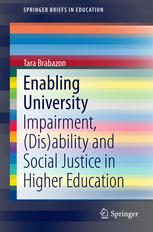

Most ebook files are in PDF format, so you can easily read them using various software such as Foxit Reader or directly on the Google Chrome browser.
Some ebook files are released by publishers in other formats such as .awz, .mobi, .epub, .fb2, etc. You may need to install specific software to read these formats on mobile/PC, such as Calibre.
Please read the tutorial at this link: https://ebookbell.com/faq
We offer FREE conversion to the popular formats you request; however, this may take some time. Therefore, right after payment, please email us, and we will try to provide the service as quickly as possible.
For some exceptional file formats or broken links (if any), please refrain from opening any disputes. Instead, email us first, and we will try to assist within a maximum of 6 hours.
EbookBell Team

4.1
20 reviewsThis work takes the most recent, interdisciplinary research and demonstrates how to make higher education institutions open, accessible and socially just for staff and students with disabilities. Combining the scholarly fields of media platform management, information literacy, internet studies, mobility studies and disability studies, this book offers a guide and method to consider how students and staff with differing needs move through university processes, spaces and interfaces. It captures the challenges and potentials of both the online and offline university. The key concept of the book is universal design. This term and theory is used to move beyond the medical and social model of disability that disconnect and separate the issues of disability and impairment from core societal concerns. This book confirms that most of us will be touched by impairment through our lives. When matched with the necessity to retrain and gain new skills for a post-recession future, there must be a renewed commitment to not only the widening participation agenda of higher education, but also the enabling of universities for men and women with impairments.